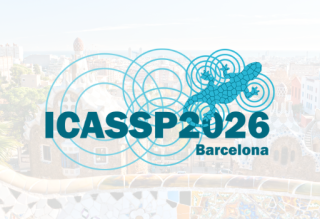Early Stage Researcher (M/F/D) - Coded waveforms for colocated MIMO radar using sparse modelling
Top Reasons to Join SPS Today!
1. IEEE Signal Processing Magazine
2. Signal Processing Digital Library*
3. Inside Signal Processing Newsletter
4. SPS Resource Center
5. Career advancement & recognition
6. Discounts on conferences and publications
7. Professional networking
8. Communities for students, young professionals, and women
9. Volunteer opportunities
10. Coming soon! PDH/CEU credits
Click here to learn more.
Early Stage Researcher (M/F/D) - Coded waveforms for colocated MIMO radar using sparse modelling
A Multiple Input Multiple Output MIMO radar makes use of orthogonal transmit waveforms either in time, in frequency or in code, in order to exploit diversity gain (due to the larger number of degrees of freedom than their phase-array counterparts) and obtain more information from a radar scenario or target. Time Domain Multiplexing at transmit is an easy and cost-effective approach to achieve orthogonality but it implies increasing measurement time with the number of transmitter and a potential ambiguity for Doppler-shift estimation.
An alternative for exploiting MIMO diversity gain in the form of enhanced target detection and localization accuracy is to transmit simultaneously waveforms which are orthogonal in code. These waveforms need to be separated at every receiver in order to create virtual channels for each Tx-Rx module pair. However, such orthogonal signals are separable only when they are perfectly aligned. Therefore, total decoupling is not possible when time delays are considered. To achieve a suboptimal solution signals with good-correlation properties can be investigated, i.e., they should maintain orthogonality over a range of time delays big enough for the particular application, which is in general quite challenging.
The successful candidate will be employed for a maximum period of three years full-time equivalent and receives a generous financial package plus an additional mobility and family allowance according to the rules for Early Stage Researchers (ESRs) in an EU Marie Sklodowska-Curie Actions Innovative Training Networks (ITN). A career development plan will be prepared for each fellow in accordance with his/her supervisor and will include training, planned secondments and outreach activities in partner institutions of the network. The ESR fellows are supposed to complete their PhD thesis by the end of the 3rd year of their employment. For more information please visit the Marie Sklodowska-Curie Actions Innovative Training Networks website.
The main goal of this research project is to find optimum phase-coded waveforms for Compressive Sensing MIMO radar and employ sparse reconstruction to estimate unknown target parameters (delay, Doppler, angle). Additionally, other MIMO waveforms will be considered, time domain multiplexing (TDM), frequency domain multiplexing (FDM) and Doppler domain Multiplexing (DDM) for comparison and validation purposes.
YOUR TASKS
- Selection of one or more convenient phase-coded waveforms (e.g. zero correlation zone sequences).
- Assess performance by an ambiguity function based analysis. For comparison purposes frequency hopping codes can be evaluated.
- Design of optimal codes using innovative techniques such as game theory or genetic algorithms.
- Signal processing of coded MIMO radar data via sparse modeling.
- Design of transmit-receive array configuration in combination with the waveform design, eventually considering also adaptive waveform design approaches.
- Identification of advantages and limitations by synthetic and experimental tests.
PROFILE
- MSc degree or equivalent in Applied Mathematics, Electrical/Electronic Engineering, Physics, or Computer Science.
- ESRs must demonstrate that their ability to understand and express themselves in both written and spoken English is sufficiently high for them to derive the full benefit from the network training. Non-native English speakers are required to provide evidence of English language competency. (TOEFL … )
- Fluent in Matlab (preferred), or, alternatively, Python or C.
- Some knowledge and experience in a number of the following topics:
- MIMO radar
- Signal processing techniques for radar
- Compressive Sensing and sparse reconstruction methods
- Waveform design and optimization algorithms
- Bayesian filtering and adaptive systems
PLANNED SECONDMENTS
- USI (ZESS), Siegen, Germany, Prof. Dr. O. Loffeld, Prof. Dr. P. Haring Bolivar, 5 months, for the investigation on design of optimum codes, this secondment is intended to exchange knowledge on construction of codes for different sensors and applications
- SU (SPIS), Sabanci, Turkey, Prof. Dr. M. Cetin, 2 months, signal processing of coded MIMO data using CS
- WIS (SAMPL), Israel, Prof. Dr. Y. Eldar, 2 months, performance assessment and signal processing of coded MIMO data using CS
ADDITIONAL INFORMATION
Modern radar systems represent complex sensors with a variety of software-defined degrees of freedom. These systems, however, are not yet capable of self-optimization on the basis of findings derived from measurements.
In the Cognitive Radar department at the Fraunhofer FHR we combine methods of computer science, such as machine learning techniques and artificial intelligence methods, with advanced signal processing and electrical engineering approaches. The aim is to create”smart” sensor systems that are capable of adapting the waveform and the operating parameters to the scene and the mission context in a dynamic manner.
The successful candidate will join a strong and motivated research team with broad experience in MIMO radar, particularly in array design, high-resolution angular estimation, Compressed-Sensing and sparse reconstruction techniques, modulation schemes, Bayesian filtering, and adaptive systems.
More information can be found in the following links:
https://www.fhr.fraunhofer.de/en/businessunits/traffic/Cognitive-automotive-radar.html
If you are interested in the MENELAOS project and this position, please apply online (https://www.menelaos-nt.eu/esr9/).
SPS Social Media
- IEEE SPS Facebook Page https://www.facebook.com/ieeeSPS
- IEEE SPS X Page https://x.com/IEEEsps
- IEEE SPS Instagram Page https://www.instagram.com/ieeesps/?hl=en
- IEEE SPS LinkedIn Page https://www.linkedin.com/company/ieeesps/
- IEEE SPS YouTube Channel https://www.youtube.com/ieeeSPS





